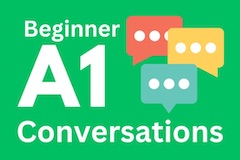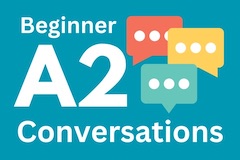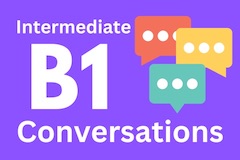
Family Connections
Two people discuss how often they meet their family.
Shantel: So Todd, you live in Japan. Do you see your family often?
Todd: Yes. I see them often. I see them usually once a year, but I write to them often, and I call them sometimes.
Shantel: Okay. And when you see them, do you go to the United States to visit them, or do they come to Japan?
Todd: I go to America, and then everyone goes to my mom's house, and everybody meets me at my mom's house, which is nice. I see my sister, and we talk a lot, and it's good.
Shantel: Does your mother miss you?
Todd: Yes. She misses me and I miss her a lot, so it's very nice to see her, and also, I miss my dad. I miss him a lot, so I'm always happy to see him.
Shantel: Nice. What about your sister? When you're in the United States, do you have some activities you like to do together?
Todd: Yeah, sometimes we do stuff together. Maybe I will meet her at a café, or I will go shopping with her, so we do something fun each time I go back.
Shantel: Nice.
Todd: Also, when I go home, I see my best friend, and that's always nice. I usually meet him for dinner, and of course I call him, and it's always nice to see my best friend. How about your family?
Shantel: Well, since I live in Japan, I also call them and write them, but usually, we only Skype about once a month.
Todd: Oh. So, who do you Skype with the most, your mom or your dad?
Shantel: I Skype the most with my father, because he wakes up very early, so his time and his schedule match my schedule, so it is easy for us to Skype.
Todd: Do you call him or does he call you?
Shantel: I usually call him, but sometimes he calls me. Usually, if he calls me, it's because I haven't called in a long time.
Todd: Uh-oh.
Shantel: Mm-hmm (affirmative).
Todd: So sometimes, you make him mad.
Shantel: A little angry.
Todd: Right. That's nice.
Shantel: But-
Todd: You have a brother too, right?
Shantel: I do have a brother, and I call him less frequently, because he is so busy with his job, so we speak about once or twice a month, by messages or by phone.
Todd: Oh, that's nice. Do you follow your family on social media?
Shantel: Yes. I use Facebook.
Todd: Oh, I use it too.
Shantel: It is a really easy way to keep in contact with them.
Todd: Yeah, I agree. What about other social media? Do you use Twitter?
Shantel: No. I don't use Twitter, and I don't use other social media either, only Facebook.
Todd: Ah, that's good, I think. Too much is too bad.
Shantel: I agree, but I do love Facebook, because I can speak with my brother, and my mother, and my father anytime.
Todd: So, with Facebook, do you check it every day?
Shantel: I do check it every day. Maybe it's a bad habit, but I do like to check it every day. Do you check your Facebook every day?
Todd: Not every day. I check it maybe three times a week.
Shantel: hree times a week?
Todd: Yeah, I don't use it much, and I don't use it on my phone.
Shantel: Oh. That's a good idea.
Todd: Yeah. I like my free time.
Shantel: Do you use other social media, such as Twitter or Instagram?
Todd: I do use Twitter, but I don't use it on my phone. I only use it on the computer.
Shantel: Okay. What about Instagram?
Todd: Oh, I don't use it at all. Do you use it?
Shantel: No, I don't use it.
Todd: Oh, that's right. You only use Facebook.
Shantel: I only use Facebook.
Todd: Oh, interesting. Well, that's nice that we can talk to our family on Skype and Facebook, because Japan is so far from America.
Shantel: Yes, and I think they are very happy too.
Todd: Yeah, I think they are happy.
Object Pronouns
- I love music. It makes me happy.
- You are here. I did not see you.
- Did you see Sue? I just saw her.
- Where is Tony? Did you see him?
- I like your jacket. Where did you buy it?
- My students are funny. I like them so much.
- These shoes are dirty. I need to clean them.
- We will leave soon. Give us a call tomorrow.
- (S) Tell me a story.
- (S) My teacher makes me laugh.
- (P) They help us a lot.
- (P) Did you see us on TV?
- (S) I like you.
- (S) I will call you later.
- (P) I like you (guys).
- (P) I will call you (all) later.
- I like Bob. I see him every day.
- I also like Sue. I often see her at the gym.
- Bob and Sue eat out often. I join them sometimes.
- They have a horse. They let me ride it.
- They have two cars. They never use them.















